School of Music
- Arts and Humanities
- School of Music
- Degrees and Programs
- Undergraduate Degrees
- Music Composition
Music Composition at Fresno State
Overview
- General Information
- Degree Programs
- Music Composition Faculty
- Applying Students
- Fresno State Composer’s Guild
- Fresno New Music
- Alumni
- Resources for Current Students
General Information
The mission of the Fresno State Music Composition Program is to provide students with
the skills and knowledge necessary to compose music for a wide variety of venues,
including music for the concert hall, television and film, and for digital media.
This mission is supported through the development of musical creativity and technical
proficiency. The Music Composition option is designed to provide a comprehensive music
education, covering a wide variety of musical genres, ensembles, styles, and compositional
practices.
Music Composition at Fresno State is a rigorous program that focuses on the composition
of music in a concert music environment, while simultaneously developing professional
skills that are applicable to all genres of music composition. All students in the
program are provided with a thorough grounding in the idiomatic writing of music for
all orchestral and band instruments, as well as all voice types. Students are provided
with additional instruction in the analysis of music, knowledge of 20th and 21st century
concert music literature, recording and MIDI music production skills, and advanced
counterpoint. All composition students are encouraged to program their works each
semester’s Student Composers’ Recital, which is open to the public. The program culminates
with a senior recital of the student’s music, performed by fellow music students and
ensembles. In addition, students are often provided with opportunities to have their
works performed on our ensemble concerts. Past performances of student works have
included concerts by the Fresno State Symphony Orchestra and the Fresno State Percussion
Ensemble.
The composition program is supported by the CSU Fresno Composer's Guild, an official club recognized by Fresno State Associated Students Inc. The Composer's Guild provides educational and social opportunities through weekly meetings, as well as support for frequent guest activities including guest composer master classes and the Fresno New Music Festival.
Degree Programs
Our Bachelors of Music in Composition is designed to work with undergraduate students interested in learning the craft of composition. While we emphasize composing concert music, the skills developed in our program translate to all disciplines of music making. Students interested in pursuing this option should submit a portfolio of scores as part of their application (see Applying Students for more information). For course information, please go to the University Catalog or contact Dr. Kenneth Froelich (kfroelich@csufresno.edu).
M.A. in Music – Performance option with an emphasis in Composition
Our Masters of Arts degree in Music Performance with a Composition Emphasis is a fully-fledged Music Composition program for students who have either completed an undergraduate program in music composition or have completed another music degree option and can demonstrate sufficient skill in composition through their portfolio (see Applying Students for more information). All students enrolled in the program are required to take composition lessons every semester, as well as receive additional instruction in music theory and music history. For course information, please go to our Department Graduate student page or contact Dr. Kenneth Froelich.
Music Composition Faculty
- Dr. Kenneth Froelich, Professor of Music (Theory and Composition)
- Dr. Benjamin Boone, Professor of Music (Theory and Composition)
- Dr. Bryce Cannell, Lecturer of Music
- Professor Mason Lamb, Lecturer of Music
Applying Students
-
-
Bachelors of Music: Composition
-
- Students interested in pursuing the B.M. in Composition should first fill out the
music department application page.
- Complete the Fresno State undergraduate application.
- For information on additional materials, please see below.
-
- Masters of Arts – Music: Performance option with an emphasis in Composition
- Students interested in pursuing the M.A. in Music – Performance option with an emphasis
in Composition should first fill out the music department application
- Complete the Fresno State graduate application
- For information on additional materials, please see below.
- Additional Materials
All students applying to study in either the BM or MA in music composition are required to submit a portfolio of materials as part of their application. This will include:
- Three representative compositions. These scores should be notated out, either in music notation software (i.e. Finale, Sibelius, etc.) or by hand. Scores will be submitted as PDF files.
- Audio recordings of each piece. Recordings may be MIDI realizations (for students applying to the MA program, MIDI is strongly discouraged). Recordings should be submitted as audio files.
Once an application has been received, please reach out to Dr. Froelich at kfroelich@mail.fresnostate.edu so that a Google Drive Folder may be created. Application files will be uploaded to this folder.
Fresno State Composer’s Guild
The Fresno State Composer’s Guild is an officially recognized club (ASI) that supports the music composition program. Membership includes all students enrolled in the music composition option, as well as students who are interested in learning about composition and music students interested in the performance of new music. The Composer’s Guild hosts weekly meetings and workshops, where guest composers are invited to speak, student composers discuss their upcoming performances, and members share their works-in-progress. In addition, the Composer’s Guild serves as the student executive board for Fresno New Music.
Members of the Fresno State Composer’s Guild also serve as members of the Society of Composers, Inc. (SCI) student chapter at Fresno State.
Composition Alumni
- Leslie Bassett (distinguished alumnus, honorary doctorate)
- Charles Amirkhanian
- Mark Carlson
- Brad Hufft
- Jeff Atmajian
- Bob Allaire
- Nathaniel Dahman (BA: Music, composition option, 2007)
- Bryce Cannell (MA: Music Performance, composition emphasis, 2009)
- Patrick Martin (BA: Music, composition option, 2010)
- Joseph Bohigian (BA: Music Composition option, 2016)
Resources for Current Students
Theory and Composition Faculty
The theory and composition faculty have achieved recognition on the local, national and international levels, and our alumni have gone on to study at prestigious graduate schools. The faculty have received numerous national and international awards, presented compositions and papers at national and international festivals and conferences, received performances of their works by acclaimed performers, published numerous articles in diverse subject areas, published compositions in numerous genres, contributed articles to Grove's Dictionary of Music and Musicians, and received awards for outstanding instruction.
Faculty Links
Diagnostics
Undergraduate Expectations
MUSIC 40 - Entrance Examination
Students registering for Music 40 will be expected to know the following, prior to enrollment. An examination will be given to evaluate these skills during the first week of class. Students scoring lowly will be advised to drop Music 40 and enroll in Music 9. Students will then be unable to enroll in Music 40 until the following fall.
It is expected that you will possess the fundamental skills listed below prior to your enrollment in Music 40:
- Ability to read pitches in treble and bass clef.
- Ability to recognize and write key signatures up to 4 sharps and/or 4 flats.
- Ability to play simple melodies on the piano.
- Ability to read notated rhythmic values.
Music 40 Sample Examination
I. Write the names of these pitches below each note:
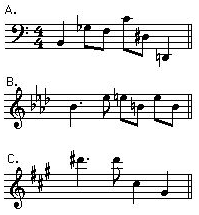
II. Write the name of the major key represented by the following key signatures:
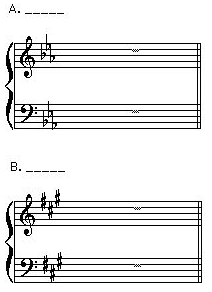
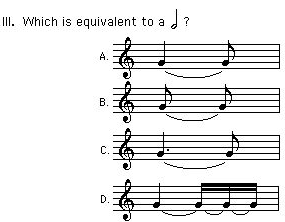
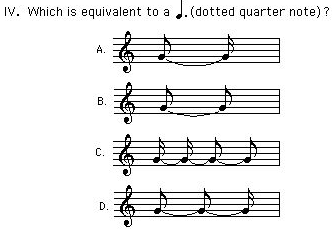
V. Which of the following rhythms is being clapped by the instructor?
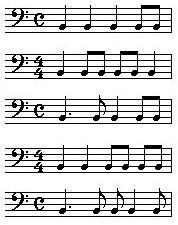
VI. Which type of note is needed to properly complete this measure?

Answers:
I.
A) B, Gb, F, C, D#, D
B) Bb, Eb, E, B, E, B
C) D#, D#, C#, G#
II.
A) Eb Major
B) A Major
III. C
IV. C
V. answer will vary
VI. C
To Practice Theory Skills:
- See Music Theory and Ear Training Drill Links Below:
http://www.teoria.com
http://www.musictheoryresources.com
http://www.janasoftware.co.uk/pet.htm - Get a music theory software program such as Musica Practia, Aurilia, or MacGamut
- Order a basic music book such as Bruce Benward's A Fundamentals Worktext
- The textbook used for Music 40 and 41is Bruce Benward's Music In Theory and Practice vol 1 (book and workbook).
Graduate Expectations
Music 204 - Entrance Examination
Near the beginning of fall semester, entering graduate students will take a Graduate Diagnostic Examination in music theory. The primary purpose of this examination is to alert students to any deficiencies they might have in basic music theory knowledge. Students with deficiencies will be expected to rectify those deficiencies prior to enrollment in Music 204, which is offered in spring semester only. In this manner, students will take the diagnostic, receive feedback, and then have at least a few months to review any essential materials prior to enrollment in Music 204.
During the first class of Music 204, another examination will be given to discern whether any deficiencies in basic theory knowledge still exist. If they do, the student will be advised to drop the course, review this elementary material and re-enroll the following year.
It is expected that you will possess the fundamental skills/knowledge listed below
prior to your enrollment in Music 204:
Theory Skills
- All major and minor scales.
- Basic Roman numeral analysis, identification of keys, modulations, non-chord tones.
- Basics of form (binary, ternary, minuet and trio, rondo, sonata form, variation, etc.).
- Basics of melody (motive, phrase, period, sequences. etc.).
- Chorale-style SATB part writing rules.
- Ability to spell all qualities of triads and all qualities of seventh chords.
- Ability to spell secondary dominants, secondary leading tone, Neapolitan and “augmented sixth” chords.
Aural Skills
- Distinguish root position triad qualities (major, minor, diminished, augmented).
- Distinguish basic root position seventh chord qualities (major – major 7th; Major – minor 7th; minor – minor 7th; diminished – minor 7th; and diminished – diminished 7th).
- Simple melodic/rhythmic dictation.
Music 204 Sample Examination
Advanced Placement Theory
We encourage area high school students to take Music AP courses, so that they might receive credit at Fresno State for music theory and/or ear training courses (up to all of their Freshman theory requirements).
If you are a high school teacher and need help developing an AP course, go to the College Board AP Central website and/or contact Dr. Boone.
For a full discussion of the Music Theory AP course and test (including topic outline, course description, sample exam, and grade distribution), go to this link on the College Board Website.
The AP test is divided into two components - one which tests written theory knowledge (nonaural) and one which tests listening skills (aural). Credit is given at CSUF as follows:
- Music majors and minors may receive 3 hours of credit for Music 40 if they receive a nonaural subscore of 3 or higher on the Music AP test.
- Music majors and minors may receive 3 hours of credit for Music 41 if they receive a nonaural subscore of 4 on the Music AP test.
- Music majors and minors may receive 1 hour of credit for Music 1A if they receive an aural subscore grade of 3 or higher on the Music AP test.
- Music majors and minors may receive 1 hour of credit for Music 1B if they receive an aural subscore grade of 4 or higher on the Music AP test.
Theory Resources
Music 1A Resources
- What is Sightsinging? - by Lenore Hiebert
- Getting Comfortable with Numbers, Syllables, and Letter Names - by Lenore Hiebert
Music Theory and Ear Training Drill Links
If you are having trouble in music theory, it is recommended that in addition to seeking help from your instructor, you visit some of the links below for further explanation and drill. These are marvelous resources. A recommended off-line resource is Greg Steinke's Harmonic Materials in Tonal Music: A Programmed Guide, vols. 1 and 2, which is located in The Library.
Please give us feedback by letting us know what sites below have proven to be most helpful to you, or if you find other helpful sites we should include here:
- www.musictheory.net (excellent interactive theory lessons, theory trainers, ear training trainers, manuscript paper)
- www.teoria.com (excellent interactive exercises and theory/ear training drills, including jazz scales, modes, rhythm dictation, etc.)
- www.emusictheory.com (theory drills)
- www.ossmann.com/bigears/ (ear trainer - intervals)
- www.musictheory.halifax.ns.ca/lessons.html (bottom of page has self-quizzes)
- www.MiBAC.com (music fundamentals)
- www.musictheoryresources.com (first aid for theory students)
Music Theory Sites
- Society of Music Theory
- Journal of Music Theory Pedagogy
- Music Theory Spectrun
- Music Theory (Jay Tomlin)
- Music Theory Midwest
- IU Theory Association - see links
- West Coast Conference of Music Theory and Analysis
Composition Resources
Benjamin Boone's article " Career Development 101," from ComposerUSA , Series IV, Vol. 10, No. 1.
Composition Links
Below are links to some sites of interest to composers. Let us know which sites you find most helpful, and if you discover sites you think should be linked here.
- Website of the American Music Center
- Online library and listening room
- wonderful new music magazine
from the American Music Center - Performing rights organization. See "career advice"
- BMI - Performing rights organization
- Composers group. News and opportunities
- National Association of Composers
- Society of Composers site
- US Copyright Office - see FAQ and Copyright Basics
- Iridian Radio Broadcasting
Theory and Composition Courses
See catalog for complete course descriptions and up-to-date changes.
Undergraduate Courses
- Music 1A Ear Training and Sight Singing I (1)
- Music 1B Ear Training and Sight Singing II (1)
- Music 47 Introduction to Music Technology (2)
- Music 40 Theory and Literature I (3)
- Music 41 Theory and Literature II (3)
- Music 42 Theory and Literature III (3)
- Music 43 Theory and Literature IV (3)
- Music 48 Seminar in Composition (2)
- Music 81 Basic Improvisation (2)
- Music 117C 05 New Music Ensemble (1)
- Music 140T Topics in Theory (3)
- Music 141 Seminar in Modal Counterpoint (3)
- Music 142 Seminar in Canon and Fugue (3)
- Music 144 Form and Analysis (3)
- Music 148 Composition (1)
- Music 150A Seminar in Electronic Music I (3)
- Music 182 Basic Arranging (3)
- Music 183 Advanced Choral Arranging (3)
- Music 184 Advanced Instrumental Arranging (3)
- Music 186 Arranging and Composing Using MIDI (3)
Graduate Courses
- Music 204 Graduate Music Theory Survey (3)
- Music 234 Studies in Composition (2; max total 6)
- Music 240T Advanced Topics in Music Theory (3; repeatable)
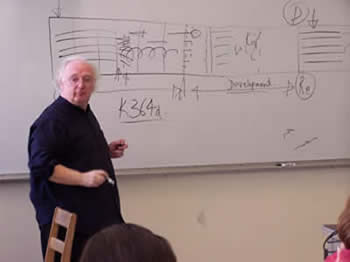
Internationally known composer, Phil Wilby (University of Leeds - Leeds, England) lecturing to Fresno State students.